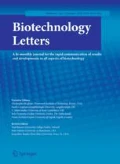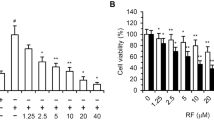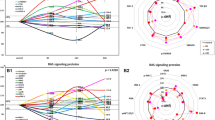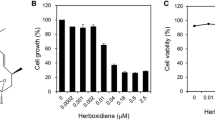Abstract
3-O-Acetyloleanolic acid, a pentacyclic triterpenoid isolated from cowpea seeds, inhibited proliferation, migration and tube formation of human umbilical vein endothelial cells (HUVECs) in a dose-dependent manner. HUVECs. The induced apoptosis was characterized by detection of cell surface annexin V and sub-G1 populations. The number of cells immunostained with annexin V-fluorescein isothiocyanate increased after treatment with 3-O-acetyloleanolic acid. The sub-G1 cell populations were also increased in treated HUVECs. 3-O-Acetyloleanolic acid induced activation of caspase 3, a critical mediator of apoptosis signaling. It also significantly inhibited angiogenesis in an in vivo Matrigel plug assay. 3-O-Acetyloleanolic acid thus exhibits anti-angiogenic effects and induces apoptosis in HUVECs and the results suggest that it has a potential use for suppression of the tumor growth stimulated by angiogenesis.





Similar content being viewed by others
References
Chavaskis E, Dimmeler S (2002) Regulation of endothelial cell survival and apoptosis during angiogenesis. Arterioscler Thromb Vasc Biol 22:887–893
Conway EM, Collen D, Carmeliet P (2001) Molecular mechanisms of blood vessel growth. Cardiovasc Res 49:507–521
Cui EJ, Park JH, Park HJ, Chung IS, Kim JY, Yeon SW, Baek NI (2011) Isolation of sterols from cowpea (Vigna sinensis) seeds and their promotion activity on HO-1. J Korean Soc Appl Biol Chem 54:362–366
Cui EJ, Song NY, Shrestha S, Chung IS, Kim JY, Jeong TS, Baek NI (2012) Flavonoid glycosides from cowpea seeds (Vigna sinensis K.) inhibit LDL-oxidation. Food Sci Biotechnol 21:619–624
Davis DW, Oelke EA, Oplinger ES, Doll JD, Hanson CV, Putnam DH (1991) Alternative field crops manual. University of Wisconsin & University of Minnesota. http://www.hort.purdue.edu/newcrop/afcm/cowpea.html
Duval H, Harris M, Li J, Johnson N, Print C (2003) New insights into the function and regulation of endothelial cell apoptosis. Angiogenesis 6:171–183
Folkman J (2003) Angiogenesis and apoptosis. Semin Cancer Biol 13:159–167
Folkman J, Shing S (1992) Angiogenesis. J Biol Chem 267:10931–10934
Kerbel RS (2006) Antiangiogenic therapy: a universal chemosensitization strategy for cancer? Science 312:1171–1175
Konopleva M, Tsao T, Estrov Z, Lee RM, Wang RY, Jackson CE, McQueen T, Monaco G, Munsell M, Belmont J, Kantarjian H, Sporn MB, Andreeff M (2004) The synthetic triterpenoid 2-cyano-3,12-dioxooleana-1,9-dien-28-oic acid induces caspase-dependent and -independent apoptosis in acute myelogenous leukemia. Cancer Res 64:7927–7935
Laszcyk MN (2009) Pentacyclic triterpenes of the lupane, oleanane and ursane group as tools in cancer therapy. Planta Med 75:1549–1560
Lee SM, Lee TH, Cui EJ, Baek NI, Hong SG, Chung IS, Kim JY (2011) Anti-inflammatory effects of cowpea (Vigna sinensis K.) seed extracts and its bioactive compounds. J Korean Soc Appl Biol Chem 54:710–717
Oguro T, Liu J, Klaassen CD, Yoshida T (1998) Inhibitory effect of oleanolic acid on 12-O-tetradecanoylphorbol-13-acetate-induced gene expression in mouse skin. Toxicol Sci 45:88–93
Setzer WN, Setzer MC, Bates RB, Jackes BR (2000) Biologically active triterpenoids of Syncarpia glomulifera bark extract from Paluma, North Queensland, Australia. Planta Med 66:176–177
Songo I, Vannini N, Lorusso G, Cammarota R, Noonan DM, Generoso L, Sporn MB, Albini A (2009) Anti-angiogenic activity of a novel class of chemopreventive compounds: oleanic acid terpenoids. Recent Results Cancer Res 181:209–212
Tosetti F, Ferrari N, Flora SD, Albini A (2002) Angioprevention: angiogenesis is a common and key target for cancer chemopreventive agents. FASEB 16:2–14
Villegas R, Gao YT, Yang G, Li HL, Elasy TA, Zheng W, Shu XO (2008) Legume and soy food intake and the incidence of type 2 diabetes in the Shanghai Women’s Health Study. Am J Clin Nutr 87:162–167
Yamaguchi C, In Y, Wada S, Yamada T, Tokuda H, Tanaka R (2009) Cancer chemopreventive activity of oleanane-type triterpenoids from the stem bark of Betula ermanii. Chem Biodivers 6:1093–1100
Yoo KH, Park JH, Cui EJ, Kim KI, Kim JY, Kim JY, Hong SG, Baek NI, Chung IS (2012) 3-O-Acetyloleanolic acid induces apoptosis in human colon carcinoma Hct-116 cells. Phytother Res 26:1541–1546
Zhou JR, Gugger ET, Tanaka T, Guo YP, Blackburn GL, Clinton SK (1999) Soybean phytochemicals inhibit the growth of transplantable human prostate carcinoma and tumor angiogenesis in mice. J Nutr 129:1628–1635
Acknowledgments
This study was supported by a Grant from the Basic Science Research Program through the National Research Foundation of Korea (NRF) funded by the Ministry of Education, Science and Technology (2012R1A1B3001575).
Author information
Authors and Affiliations
Corresponding author
Additional information
En-Ji Cui and Jeon Hwang-Bo have contributed equally to this study.
Rights and permissions
About this article
Cite this article
Cui, EJ., Hwang-Bo, J., Park, JH. et al. 3-O-Acetyloleanolic acid exhibits anti-angiogenic effects and induces apoptosis in human umbilical vein endothelial cells. Biotechnol Lett 35, 1807–1815 (2013). https://doi.org/10.1007/s10529-013-1266-7
Received:
Accepted:
Published:
Issue Date:
DOI: https://doi.org/10.1007/s10529-013-1266-7




